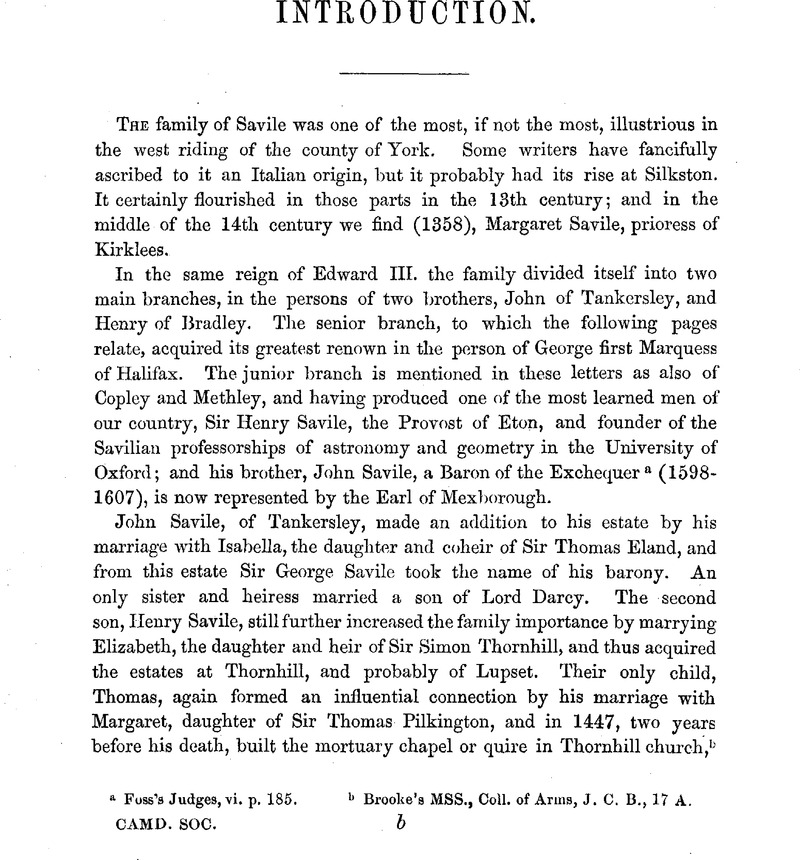No CrossRef data available.

page i note a Fuss's Judges, vi. p. 185.
page i note b Brooke's MSS., Coll. of Arms, J. C. B., 17 A.
page ii note a London, 1851, p. 20.
page iii note a Domestic, Eliz. iv. art. 32, xii. 3. In vol. xxiv. art. 34–52, it appears that Edward had been conveyed away on 9th September, 1562, by his base brother Robert, from the Earl's custody to Bristol, and married there in a chamber to a simple poor woman : and that the Lord Keeper was thereupon required to summon before him and examine Edward and his base brother, and others his companions.
page iii note b See post, p. 113.
page iii note c MSS. Coll. of Arms, 2 D 14, fol. 147, 205, C 34, f. 7. Notts. For the means of referring to these MSS., and for other information in the notes, I am indebted to the kindness of T, W. King, Esq. F.S.A., York Herald.
page iv note a Stafford's Letters, i. 169.
page iv note b Rapin, ii. 222.
page iv note c Hallamshire, p. 106.
page v note a The-first born child, Mary, was no doubt then dead.
page v note b Sir John Ramsden, Sir Ingram Hopton, and Francis Neville, with Sir William Savile, were four out of the six of the King's party who on 29th September, 1642, signed at Rodwell the futile agreement for a suspension of military actions and preparations in Yorkshire. Drake's Ebor., p. 163.
page vi note a This son William died before 25 August, 1660, when Sir George Savile signed the pedigree in the Coll. of Arms. The estate at Barroughby then came to his youngest brother, Henry Savile, and is often referred to in the following letters.
page vi note b Where a transcript for “literary purposes ” was allowed to be taken on payment only of the fee for inspecting an original will.
page vi note c This date is from the Thornhill register, and therefore the date given in note a p. 1, from MS. C 34, f. 7 Notts, is incorrect.
page vii note a Hunter's Hallamshire, pp. 111, 112.
page vii note b She remarried Sir Thomas Chicheley.
page viii note a See note, p. 84.
page ix note a It was about this period that the following lines in Rochester's satire on Coxcombs in Place were written, for Dryden was cudgelled in Rose Street in December 1679—
Who would be … a cringing knave ?
Like Halifax wise, like beauish Pembroke brave ?
What drudge would be in Dryden's cudgel'd skin,
And who'd be safe and senseless like Tom Thynne ?
page ix note b The Earl had obtained it by exchange from Henry VIII.
page xiii note a Diary, i. 189.
page xiv note a Vol. i. plate 48.
page xiv note b A plate of the ruins as they now exist is given in Whitaker's Leeds.
page xiv note c Rufford is extra-parochial, and the registers of Wellow, which is used for the offices of the church, commence only in 1703.
page xiv note d Page 28.
page xiv note e See p. 5.
page xiv note f Clarendon's Life, vol. ii. p. 459.
page xv note a Diary, ii. 343.
page xv note b Diary, vol. ii. p. 321.
page xvii note a See page 47.
page xvii note b See note, page 60.
page xviii note a 20 Feb. 1681–2, Secretary's letter book.
page xxi note a See p. 207.
page xxii note a Under these orders 3,319l. were collected in the city of London, and 12,788l. in the country. Other briefs were subsequently issued, one being dated 31st January, 1687; and the whole amount collected at different periods, down to 170], was no less than 136,382l. Ex inf. Peter Levesque, Esq., F.S.A.
page xxii note b MSS. State Paper Office Domestic various, No. 694. In 1687 there were no less than 15,500 Protestant refugees in England. See also note, p. 229.